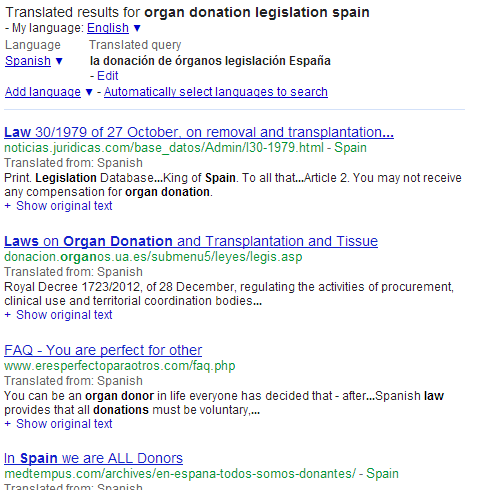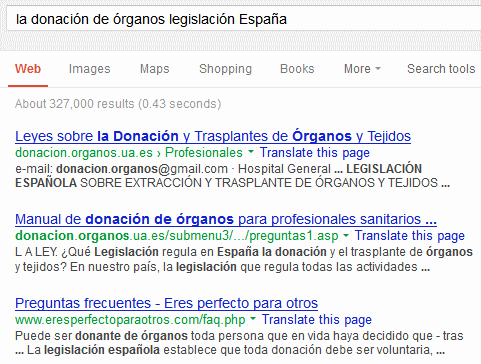Update 18th May 2013: Google has now confirmed that translated foreign pages has gone.
“The translate foreign pages feature is no longer offered. Removing features always involves tough choices, but we do think very hard about each decision and its implications for our users. You can still translate entire pages in Chrome. Streamlining enables us to focus on creating beautiful technology that will improve people’s lives.”
While the press were busy reviewing the new Google maps and reporting on the Google I/O event Google quietly dropped translated foreign pages from its search tools menu. Translated foreign pages was a great way of searching for information in a language other than your own. It was invaluable when researching individuals or companies based in another country, or for news and legislation in a language other than your own. You ran your search in Google as normal and then clicked on ‘Search tools’ in the menu above your results followed by ‘All results’ and ‘Translated foreign pages’. If you included a country in your search Google would assume that you wanted information from pages in that country’s language. It would translate your search into that language and then translate the pages it found into your own language. If you did not mention a country in your search it would list the most commonly used languages. This would sometimes change according to your previous choice of languages but you could also add languages to the list.

It wasn’t perfect but it was a great way of finding local content, which is often in a foreign language.
The option disappeared from the search tools menu earlier this week. There was no announcement from Google, which is not unusual, and it was not until a question about it was posted in a Google Groups forum that someone from Google said they would investigate. The answer they came back with does not bode well:
“This feature is currently unavailable, but we’d like to bring the functionality back in the future. I’ll give you updates as I receive them, but for now there’s no time frame for when that will happen.”
There have been similar responses to enquiries about vanishing search features in the past. The Wonderwheel is just one example. All too often Google later admits that the options have been permanently axed. It does seem strange, though, that Dan Russell, who works at Google, recently highlighted translated foreign pages in his blog at http://searchresearch1.blogspot.com/2013/04/ramong-writes-in-with-great-question-i.html
Is there an alternative? Sort of, but it is not as slick.
1. Use Google Translate (http://translate.google.com/) to translate your search into the required language.
2. Copy the translated search and paste it into Google search.
3. If you are using Google Chrome and have enabled the translate option under advanced search settings Chrome will offer to translate the page of results for you. Alternatively, or if you are using a different browser, click on the ‘Translate this page’ link next to a result to view a translation of just that page.

Of course, you have to repeat the procedure for each language you want to use but at least it can be done. All too often there is no alternative at all to search tools and commands that have been banished. Many of us are wondering which one will be next – it is inevitable that there will be a ‘next’ – and what impact it will have on the quality of search results. At present there are still techniques we can use to force Google to run a search the way we want it run but it is getting perilously close to becoming useless as a serious research tool. Time to start investigating other search tools in depth.